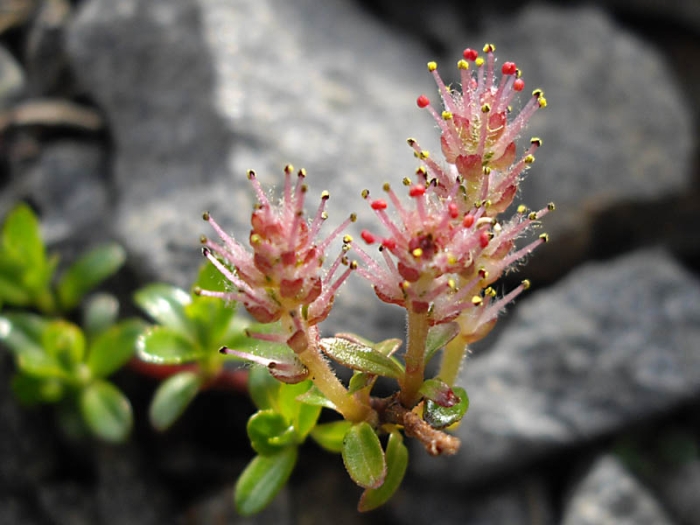Creeping Himalayan Willow
(Salix lindleyana)
Creeping Himalayan Willow (Salix lindleyana)
/
/

Ghislain118
CC BY-SA 3.0
Image By:
Ghislain118
Recorded By:
Copyright:
CC BY-SA 3.0
Copyright Notice:
Photo by: Ghislain118 | License Type: CC BY-SA 3.0 | License URL: https://creativecommons.org/licenses/by-sa/2.0 | Uploader: Ghislain118 | Publisher: Wikimedia Commons |


Estimated Native Range
Summary
Salix lindleyana, commonly known as Creeping Himalayan Willow, is a deciduous subshrub native to alpine and subalpine zones in the Himalayas. It typically grows to a height of 0.2 feet (0.06 meters) and spreads 1-2 feet (0.3-0.6 meters) wide. This plant forms low mats of foliage and is characterized by its slender, creeping stems and small leaves. The Creeping Himalayan Willow blooms with inconspicuous flowers, which are followed by cottony seeds that aid in wind dispersal. It is adapted to the harsh conditions of its native high-altitude habitat, including rocky soils and cold temperatures.
The Creeping Himalayan Willow is valued for its ability to stabilize soil and prevent erosion, making it useful for planting in rock gardens, alpine gardens, and on slopes. It thrives in full sun but can tolerate partial shade. It requires medium amounts of water and well-drained soils to mimic its native mountainous conditions. While not commonly found in cultivation, it can be an interesting addition to gardens focused on alpine or rock garden plants. Due to its specific habitat preferences, it may not be suitable for all garden settings and could require extra care to establish in lower altitude or warmer climates.CC BY-SA 4.0
The Creeping Himalayan Willow is valued for its ability to stabilize soil and prevent erosion, making it useful for planting in rock gardens, alpine gardens, and on slopes. It thrives in full sun but can tolerate partial shade. It requires medium amounts of water and well-drained soils to mimic its native mountainous conditions. While not commonly found in cultivation, it can be an interesting addition to gardens focused on alpine or rock garden plants. Due to its specific habitat preferences, it may not be suitable for all garden settings and could require extra care to establish in lower altitude or warmer climates.CC BY-SA 4.0
Plant Description
- Plant Type: Shrub
- Height: 1-1.5 feet
- Width: 1-2 feet
- Growth Rate: Moderate
- Flower Color: N/A
- Flowering Season: Spring
- Leaf Retention: Deciduous
Growth Requirements
- Sun: Full Sun, Part Shade
- Water: Medium
- Drainage: Fast
Common Uses
Bee Garden, Bird Garden, Butterfly Garden, Deer Resistant, Low Maintenance
Natural Habitat
Native to alpine and subalpine zones in the Himalayas
Other Names
Common Names: Lindley’s Willow
Scientific Names: , Salix lindleyana, Salix lindleyana var. latifolia, Salix crenata, Salix acuminatomicrophylla, Salix clavata,
GBIF Accepted Name: Salix lindleyana Wall. ex Andersson